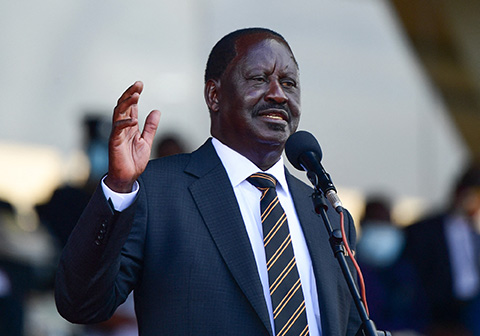Political and Regulatory Round-Up

Kenya
Raila’s ODM disbands elections board as party goes for devolved system
The Orange Democratic Movement (ODM) party has disbanded its National Elections Board (NEB) in what it says are efforts to devolve management of its elections to the grassroots.
ODM Secretary-General Edwin Sifuna, in a statement issued on Wednesday, said the party’s central committee proposed the decision during its first meeting of 2024.
As such, Sifuna said, all party elections shall be managed at the county level with two elections coordinators, one male and one female, in charge of each county.
(Source: Citizen Digital)
Tanzania
Electoral reforms bills: Views back majority votes
The Parliamentary Committee on Governance, Constitution and Legal Affairs continued to collect public opinions on three crucial election bills for the second day on Monday, with a section of participants endorsing the provision that declares a winner of the presidential polls based on majority votes.
The Presidential, Parliamentary and Local Government Elections Bill of 2023 states that the winner of the presidential polls will be declared after obtaining a majority of votes.
There has been a section of political stakeholders who have been advocating for legal changes requiring that, in order for the president to win, he or she should obtain 50+1 votes, meaning more than 50 per cent.
However, some participants who shared their views yesterday suggested that considering the experience of low turnout in the previous elections, it would be impossible to implement the 50+1 threshold.
(Source: Daily News)
Uganda
Parliamentary Commission constituted
The Parliamentary Commission, established under Article 87A of the Constitution, has been fully constituted with the endorsement of the Leader of the Opposition and four backbench commissioners. Hon. Joel Ssenyonyi takes up the mantle of the Leader of the Opposition, replacing Hon. Mathias Mpuuga.
Mpuuga will now serve as a backbench Commissioner of the House representing the Opposition, alongside Hon. Solomon Silwany, Hon. Prossy Akampurira and Hon. Esther Afoyochan, who retained their positions as backbench commissioners representing the ruling National Resistance Movement Party.
Speaker Anita Among made the pronouncements during the plenary sitting on Tuesday, January 9, 2024, after both the Government Chief Whip, Hon. Hamson Obua, and the Chief Opposition whip, Hon. John Baptist Nambeshe, formally presented the names of the office bearers.
(Source: Uganda Parliamentary Website)
Rwanda
PM Sunak facing major Tory revolt over Rwanda bill
Rishi Sunak is facing a significant rebellion from Tory MPs over legislation to revive his plan to send some asylum seekers to Rwanda. Over 30 backbenchers on the right of the party are backing plans to change the bill next week to make it harder for people to appeal deportation. The amendments underline the scale of Tory division over the policy, which the PM has made a priority.
Ministers insist the bill allows only a “vanishingly small” number of appeals. Those backing the amendments include former Tory leader Sir Iain Duncan Smith and a clutch of former cabinet ministers, including former home secretary Suella Braverman. Ex-migration minister Robert Jenrick, who resigned over the draft law last month and is a leading rebel, said the current bill would fail to prevent a “merry-go-round” of individual appeals.
(Source: BBC News)
Somalia
Joining the EAC could usher in a new era of growth for Somalia, but a resurgence of violence may compromise new opportunities
During the tenure of the previous president, Mohamed Abdullahi Mohamed, the relationship between the federal states and the central government deteriorated, and interactions with the African Union became strained. However, since 2022, Somalia has shown signs of transitioning from a failed to a fragile state. This change is attributed to partial success in curbing the militant Islamist group al-Shabaab, improved relations between the federal government, regional entities and clans, and strides made in institutionalising power. The new president’s effective “nomad diplomacy” has allowed him to benefit from a clan rebellion against al-Shabaab, which has been challenging the sovereignty of the Somali state for the past two decades.
(Source: GIS Reports)

